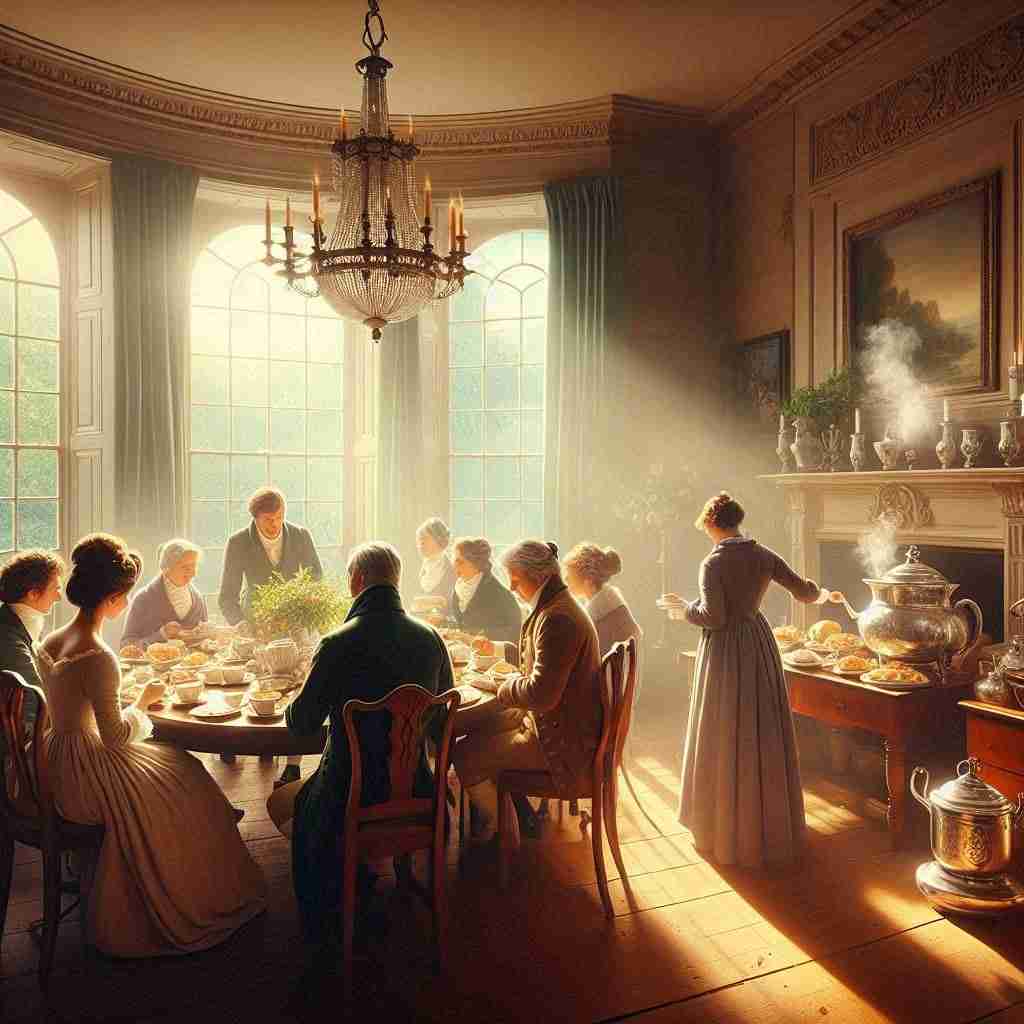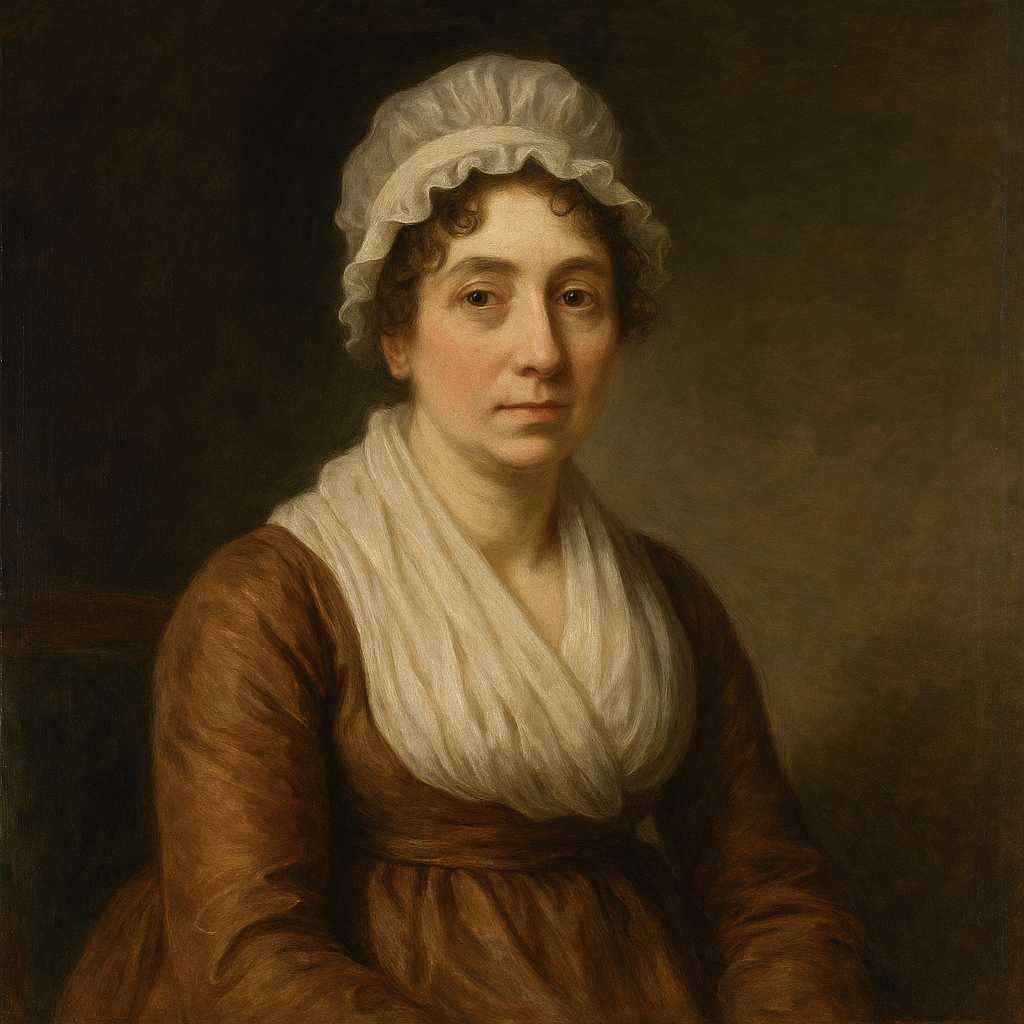Breakfast
Mary Lamb
1764 to 1847

Want to track your favorites? Reopen or create a unique username. No personal details are required!
A dinner party, coffee, tea,
Sandwich, or supper, all may be
In their way pleasant. But to me
Not one of these deserves the praise
That welcomer of new-born days,
A breakfast, merits; ever giving
Cheerful notice we are living
Another day refreshed by sleep,
When its festival we keep.
Now although I would not slight
Those kindly words we use ‘Good night’,
Yet parting words are words of sorrow,
And may not vie with sweet ‘Good Morrow’,
With which again our friends we greet,
When in the breakfast-room we meet,
At the social table round,
Listening to the lively sound
Of those notes which never tire,
Of urn, or kettle on the fire.
Sleepy Robert never hears
Or urn, or kettle; he appears
When all have finished, one by one
Dropping off, and breakfast done.
Yet has he too his own pleasure,
His breakfast hour’s his hour of leisure;
And, left alone, he reads or muses,
Or else in idle mood he uses
To sit and watch the venturous fly,
Where the sugar’s piled high,
Clambering o’er the lumps so white,
Rocky cliffs of sweet delight.
Mary Lamb's Breakfast
Introduction
Mary Lamb's poem "Breakfast" offers a deceptively simple meditation on the quotidian pleasures of the morning meal. However, beneath its light-hearted surface lies a complex exploration of time, ritual, and the subtle joys that punctuate daily life. This essay will delve into the rich tapestry of imagery, meter, and thematic content that Lamb weaves throughout her ode to breakfast, examining how the poet elevates a mundane routine to the status of a cherished "festival" that renews both body and spirit.
Historical and Literary Context
To fully appreciate "Breakfast," one must first consider its place within the broader context of Mary Lamb's life and work. Lamb, writing in the early 19th century, was part of a literary circle that included her brother Charles Lamb and luminaries such as Samuel Taylor Coleridge and William Wordsworth. While often overshadowed by her male contemporaries, Mary Lamb's contributions to literature, particularly in collaboration with her brother, were significant.
The poem's celebration of domestic life and simple pleasures aligns with the Romantic movement's emphasis on the everyday and the natural world. However, Lamb's focus on the social aspects of breakfast and its role in knitting together the fabric of daily life sets her work apart from the more solitary, nature-focused musings of many of her Romantic peers.
Structure and Form
"Breakfast" consists of 32 lines arranged in rhyming couplets, creating a sense of harmony and continuity that mirrors the recurring nature of the morning ritual it describes. The regularity of the rhyme scheme (AABBCC...) provides a comforting predictability, much like the routine of breakfast itself.
The poem's meter is predominantly iambic tetrameter, with occasional variations that serve to emphasize particular words or phrases. This choice of meter creates a rhythm reminiscent of casual conversation, appropriate for a poem that celebrates social interaction and companionship.
Thematic Analysis
The Supremacy of Breakfast
Lamb begins by establishing breakfast's superiority over other meals and social gatherings. The opening lines dismiss dinner parties, coffee, tea, sandwiches, and suppers as merely "pleasant," reserving her highest praise for breakfast. This hierarchy is not merely about gustatory preference; rather, it speaks to the unique position breakfast occupies as a threshold between sleep and wakefulness, between the old day and the new.
The poet's declaration that breakfast gives "Cheerful notice we are living / Another day refreshed by sleep" underscores the meal's symbolic significance. It is not just sustenance for the body, but a celebration of renewal and continuity. This framing of breakfast as a daily rebirth imbues the poem with a subtle spirituality, elevating the mundane to the sacred.
The Social Aspect of Breakfast
While Lamb acknowledges the pleasantness of other social gatherings, she particularly emphasizes the unique camaraderie of the breakfast table. The phrase "When in the breakfast-room we meet, / At the social table round" evokes images of King Arthur's Round Table, suggesting an egalitarian and intimate gathering of friends or family.
This social dimension is further enhanced by the contrast between the communal experience of most diners and the solitary latecomer, "Sleepy Robert." His isolation serves to highlight the togetherness enjoyed by the others, while also providing a counterpoint that enriches the poem's exploration of breakfast's multifaceted nature.
The Sensory Experience
Lamb's poem is rich in sensory detail, particularly auditory imagery. The "lively sound / Of those notes which never tire, / Of urn, or kettle on the fire" creates a vivid soundscape that brings the scene to life. This focus on sound reinforces the idea of breakfast as an awakening, with the kettle's whistle serving as a kind of reveille for the household.
The visual imagery is equally evocative, particularly in the final stanza where Lamb describes the "venturous fly" climbing the "Rocky cliffs of sweet delight" formed by piled sugar. This miniature adventure tale, observed by the idle Robert, transforms the breakfast table into a landscape of wonder and exploration, suggesting that even in the most familiar settings, there is always something new to discover if one looks closely enough.
Language and Diction
Lamb's choice of words throughout the poem is carefully calibrated to reinforce its themes. The use of terms like "festival" and "welcomer of new-born days" to describe breakfast imbues the meal with a sense of ceremony and importance. Similarly, the juxtaposition of "Good night" as "parting words" of sorrow with the "sweet 'Good Morrow'" of greeting emphasizes the poem's focus on beginnings and renewal.
The poet's language is generally simple and accessible, reflecting the unpretentious nature of the subject matter. However, this simplicity belies the careful craft evident in lines such as "Cheerful notice we are living," where the placement of "living" at the end of the line gives it particular emphasis, underscoring the poem's celebration of life and vitality.
Symbolism and Deeper Meanings
While "Breakfast" operates beautifully as a straightforward celebration of morning rituals, it also invites deeper interpretation. The contrast between the communal breakfast and Robert's solitary late arrival can be read as a commentary on social connection and isolation. Robert's preference for observing the fly's sugar-mountain adventure rather than engaging with others might be seen as a gentle critique of those who remain detached from the social fabric.
Furthermore, the poem's emphasis on renewal and beginnings can be interpreted as a metaphor for life itself. Each day, like each life, begins with promise and potential, symbolized by the fresh start that breakfast represents. The shared meal becomes a microcosm of society, with its blend of conversation, sensory pleasures, and small, observed wonders.
Conclusion
Mary Lamb's "Breakfast" reveals itself to be far more than a simple paean to the first meal of the day. Through its careful structure, evocative imagery, and thematic depth, the poem offers a nuanced exploration of daily rituals, social bonds, and the small joys that give life its savor.
By focusing on a ubiquitous, often overlooked aspect of daily life, Lamb encourages readers to find beauty and meaning in the familiar. Her portrayal of breakfast as a "festival" that marks our continued existence transforms a routine activity into a celebration of life itself. In doing so, "Breakfast" not only elevates the mundane but also reminds us of the profound interconnectedness of our daily experiences.
Ultimately, Lamb's poem serves as a gentle reminder to approach each day with the freshness and appreciation of a new beginning, to savor the sensory and social pleasures that surround us, and to find wonder in the smallest details of our lives. In its unassuming way, "Breakfast" offers a philosophy of mindful living, wrapped in the comforting rhythms of rhyming couplets and the steam rising from a morning cup of tea.
This text was generated by AI and is for reference only. Learn more
Want to join the discussion? Reopen or create a unique username to comment. No personal details required!



Comments
No comments yet. Be the first to comment!